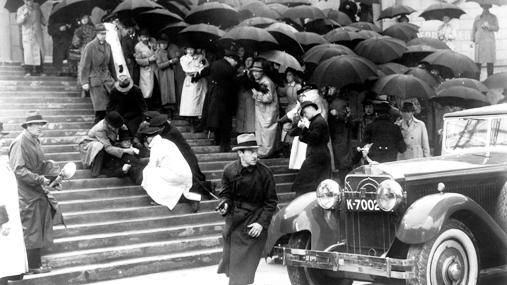Alfred Hitchcock made this appeal to join the fight against Hitler a year before the attack on Pearl Harbor. Now this film is valued for being one of the best thrillers of its time. 
There was a minor category of Hollywood films, made between Hitler’s invasion of Poland in 1939 and the attack on Pearl Harbor in late ’41, that I’ve nicknamed “We Need to Enter the War” films. The American public was largely wary of joining in—the attitude being “let Europe solve its own problems”—but a significant portion of the filmmaking industry wanted people to know about the danger of isolationism. Possibly the best example of this kind of movie is Foreign Correspondent, from 1940, directed by Alfred Hitchcock, himself a recent arrival to Hollywood from England.
A brash young reporter (played by Joel McCrea) is sent to Europe on the eve of war to provide a fresh perspective for American readers. He hooks up with a peace organization in Holland, run by the urbane Mr. Fisher (Herbert Marshall), and falls in love with Fisher’s daughter (Laraine Day). When the reporter witnesses the assassination of a Dutch diplomat who was central to the cause of peace, he ends up on the trail of a mysterious organization of spies.
It’s easy to forget that the thriller genre didn’t get very much respect until Hitchcock came around. He brought style and dedication to the form, and this particular example is one of the smoothest and most entertaining films of the ‘40s. There are two great set pieces. The assassination scene, in which a man shoots the diplomat during a downpour, then escapes through a sea of umbrellas, is a complex masterwork of editing. It’s soon followed by a sequence in a windmill (Hitchcock had a fondness for staging scenes in such out of the ordinary places) where McCrea manages to slink through the building, escaping the spies’ notice while the inner machinery rotates the blades, the moving camera providing a perfect sense of the spatial relationships in the windmill. What was already a stock situation (good guy hides within earshot of bad guys) is transformed into pure visual pleasure and excitement.
One of the more curious aspects of the film is the character played by George Sanders, a suave and witty English reporter who happens to be a friend of Fisher’s daughter, and helps the American reporter solve the mystery. Sanders is great here—in fact, he’s so good that he becomes the film’s hero, playing the key role of daredevil rescuer in the film’s finale, rather than the star McCrea, as Hollywood convention would dictate. Did Hitchcock and his screenwriter Charles Bennett, both British, elevate the English character’s role as some kind of tribute to the mother country, which was under violent siege at the time of filming? I don’t know, but it’s certainly unusual—not that it spoils the fun in any way.
Foreign Correspondent ends with a bit of uplifting propaganda, McCrea broadcasting a warning to the rest of the world, and this is perfectly understandable. But its value as entertainment outweighs its political significance, then and now.

A remarkable film from Colombia depicts how a traditional Indian tribe is corrupted by wealth and power through its involvement in the drug trade....

The true story of the 2018 effort to rescue thirteen boys trapped in a huge flooded cave in Thailand is more exciting than most...

Palestinian filmmaker Hany Abu-Assad is no stranger to controversy. His 2008 film Paradise Now presented a sympathetic portrait of suicide bombers. His latest picture...